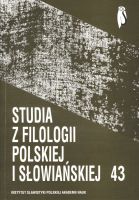Język w służbie reklamy – reklama w służbie języka (Teksty reklamy w nauczaniu języka polskiego jako obcego)
Language in service of advertising – advertising in service of language
Author(s): Ewa MasłowskaSubject(s): Language and Literature Studies
Published by: Instytut Slawistyki Polskiej Akademii Nauk
Summary/Abstract: The author presents the possibilities of broad use of advertising slogans and other advertising contents in the teaching of a foreign language. Key advantages of the linguistic material of this type, which the author lists, are primarily expressive syntactic structures – they are easy to understand and memorise, they are expressive and vivid. Another advantage is the language used in advertisements presented on billboards and TV – as it is colloquial. Impudence and expansiveness of advertisements, so arduous for an ordinary recipient, turns out to be very useful in this particular case, because slogans and phrases repeated several times are catchy, and a precisely selected illustration, often accompanied by a tune, activate additionally the remaining senses and perception skills and thanks to these factors, the message is memorised almost automatically. The author underlines that the use of advertising slogans requires a very careful selection and adjustment to the linguistic material, which is supposed to be presented during the lesson. Appropriately selected advertisements provide ready daily life scenes (family life, socialising, doctor’s consultation, workshop staff or tax counsellor advice, etc.), they involve the foreigner in the dialogue, they deliver samples of arguments as well as the means of persuasion. More sophisticated slogans, which aim at making recipients laugh, show creative possibilities of using linguistic means, they familiarise with the Polish sense of humour, with the play with words and situations. To boot, the world of advertisements transfers us into the unrealistic realm, where everything is easy and attainable. When one moves around the world of illusion, he creates a distance between the real world and fiction and sometimes takes the courage to play a part of somebody else, not restricted with any problems. It allows drifting into the world of dreams, constructed in accordance with one’s own concept and activates the students’ creative powers. The author emphasises that the linguistic material from advertising slogans cannot replace other texts, but it is worth using them for the reason of easiness of acquiring communication patterns and the possibilities of creative language use.
Journal: Studia z Filologii Polskiej i Słowiańskiej
- Issue Year: 2008
- Issue No: 43
- Page Range: 113-130
- Page Count: 18
- Language: Polish

